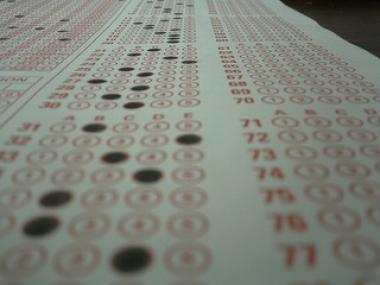
Teachers at Garfield High School in Seattle say they have voted overwhelmingly to refuse to administer a district-wide standardized test. A statement from Garfield teachers called the test a waste of time and money.
Students in Seattle Public Schools take the standardized Measures of Academic Progress (MAP) test up to three times a year, from kindergarten through ninth grade or beyond. Along with many standardized tests required by the state, the school district requires the MAP test as a measure students’ progress in reading and math.
But Garfield history teacher Jesse Hagopian says the MAP test doesn’t work. He said when freshmen take the MAP test in the fall, they usually put some effort into it. "But then the next couple times the kids don’t really take the test seriously because there’s no graduation requirements tied to it," Hagopian said. "So kids often blow off the next couple tests." That’s a problem, Hagopian said, because the test doesn’t help teachers understand how well kids are learning.
And the district uses kids’ MAP scores to evaluate how well teachers are doing their jobs.
Hagopian said teachers at Garfield are now supposed to begin the winter quarter MAP testing. But he said they’ve now voted unanimously to boycott the MAP test, minus four abstentions.
Academic Dean Kris McBride is in charge of administering the test. She says there are a lot of things wrong with the MAP, including that it doesn’t seem to align with district or state curricula. For instance, when Algebra 1 students at Garfield take the math test, "it’s filled with geometry, it's filled with probability and statistics, and other things that aren’t part of the curriculum at all," McBride said.
English teacher Kit McCormick says she was supposed to take her students for MAP testing Wednesday, but she refused. McCormick says she’s not allowed to see what's on the test, and the margin of error is so wide that the scores are meaningless. "I just see no use for it at all," she said. "And so I’m not going to do it. But I’d be happy to have my students evaluated in a way that would be meaningful for both them and me."
Hagopian said this is not an effort by Garfield teachers to avoid accountability. "It's not just that we’re against the MAP test," Hagopian said. "We want to replace it with a far better measure of academic learning, which we think is portfolios and performance-based assessment."
Hagopian said even though the MAP tests are only given for reading and math, teachers and students in all subjects are affected because the computerized test ties up Garfield's computer labs for weeks every year. He said teachers at the school calculated that the MAP test consumes 800 hours of instructional time.
Sixteen-year-old Garfield junior Alicia Butler says she and her peers understand the importance of some standardized tests, like those required to graduate or apply to college. But the MAP is an exception. "I feel like it’s kind of a waste of time to take it. It takes up class time. Some things are on there that we don’t learn," Butler said. "Since [students] are aware that we don’t need it to graduate, they’ll just start clicking on things.
A lot of these teachers here are good, and they’ll get lower evaluations, and it’s not fair."
New York University Research Professor of Education Diane Ravitch is a vocal critic of high-stakes standardized testing such as the MAP. Ravitch says teachers around the country have had enough of high-stakes tests, but that this move by Garfield teachers is unusually gutsy.
"This is the first time, to my knowledge, that the entire staff of a school has said ‘no, we will not do this. It’s not good for the students, and it’s a waste of time and money,’" Ravitch said.
University of Washington assistant professor of education Wayne Au, who supports the boycott, says that while individual teachers or parents have boycotted standardized tests in the past, it's unusual to see an entire school of teachers vote to boycott a test. "Relative to the kind of resistance we’re seeing to high-stakes standardized testing around the country, it really looks like what’s happening at Garfield is actually a unique situation," Au said.
Butler said that makes her proud of her teachers. "It helps make Garfield different from other schools, because we aren't afraid to fight for what's right," Butler said.
Meanwhile, district officials released a statement saying that the administration expects teachers to give all required tests, but added that the district is reviewing the effectiveness of the MAP test and plans a report to the school board by this spring.
Originally published in KOUW, Seattle's NPR affiliate

